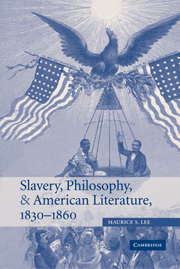Book contents
- Frontmatter
- Contents
- Acknowledgments
- Introduction
- 1 Absolute Poe
- 2 “Lord, it's so hard to be good”: affect and agency in Stowe
- 3 Taking care of the philosophy: Douglass's commonsense
- 4 Melville and the state of war
- 5 Toward a transcendental politics: Emerson's second thoughts
- Epilogue: An unfinished and not unhappy ending
- Index
4 - Melville and the state of war
Published online by Cambridge University Press: 22 September 2009
- Frontmatter
- Contents
- Acknowledgments
- Introduction
- 1 Absolute Poe
- 2 “Lord, it's so hard to be good”: affect and agency in Stowe
- 3 Taking care of the philosophy: Douglass's commonsense
- 4 Melville and the state of war
- 5 Toward a transcendental politics: Emerson's second thoughts
- Epilogue: An unfinished and not unhappy ending
- Index
Summary
Given a sufficient sense of purpose, it is possible to make all philosophy political – to embed even transcendental abstractions in temporal conditions, to evaluate the merits of theoretical speculation according to practical consequences, and to locate all intellectual efforts against a political horizon. Conversely, all politics can be made philosophical insofar as every ideological position implies an epistemology, and subjectivity describes both a way of knowing and a way of living in the world. Poe's metaphysics of slavery and race, Stowe's search for sentimental authority, Douglass's deployment of Scottish commonsense for emancipatory ends – all try to reconcile philosophy and politics, metaphysical theory and social practice, even if such reconciliation proves impossible to attain.
That said, the writings treated thus far are not exactly political philosophy, at least not as the subject was typically pursued in the antebellum United States. Though disciplinary boundaries were to some degree fluid, political philosophers before the Civil War focused on sovereignty, representation, contract, and natural rights, even as they discovered that such traditional concepts could not mediate the slavery crisis. Part of the problem, according to the erstwhile socialist and lapsed transcendentalist Orestes Brownson, was that Americans were not good theoreticians, “Notwithstanding the very general and even absorbing interest which the great mass of American citizens take in political matters, … politics as a science is / body of future readersalmost entirely unknown and unheeded among us.”
- Type
- Chapter
- Information
- Slavery, Philosophy, and American Literature, 1830–1860 , pp. 133 - 164Publisher: Cambridge University PressPrint publication year: 2005

